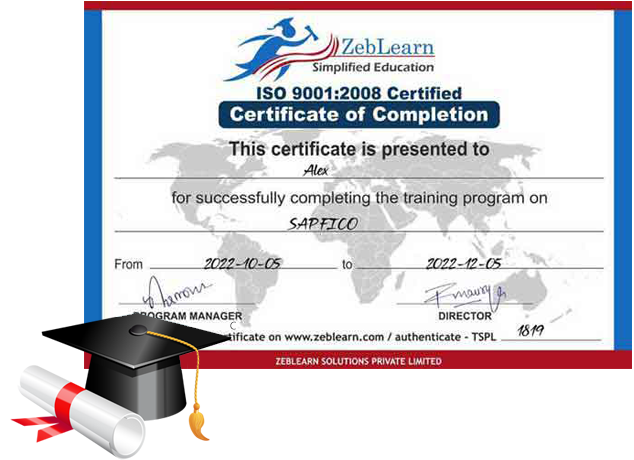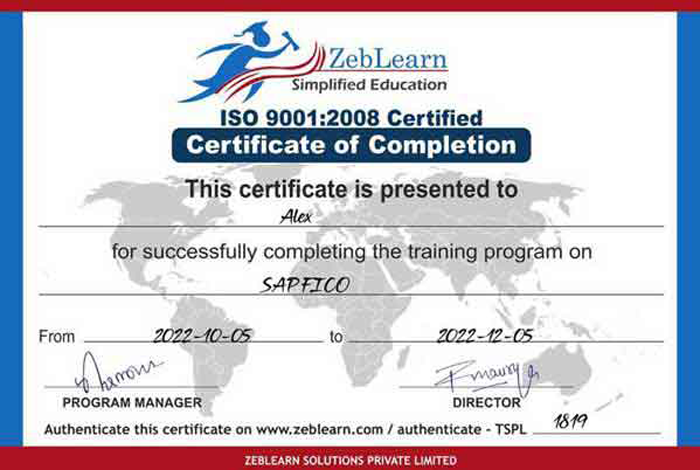- Understanding SAP IBP: Gain a comprehensive understanding of the SAP IBP module, its functionalities, and its role in integrated business planning. Learn about the key components and modules within SAP IBP, such as demand planning, inventory optimization, sales and operations planning (S&OP), supply planning, and response management.
- Mastering Planning Processes: Learn how to plan and optimize various aspects of the supply chain using SAP IBP. Understand the different planning processes, such as demand forecasting, inventory optimization, production planning, and distribution planning. Gain hands-on experience in executing planning runs, generating planning results, and evaluating planning scenarios.
- Configuring SAP IBP: Learn how to configure and customize SAP IBP to align with the organization’s supply chain planning requirements. Understand the various configuration options available and how to tailor SAP IBP to meet specific business needs. This includes configuring planning areas, master data, planning models, and integration settings.
- Demand Planning: Explore the demand planning component of SAP IBP. Learn how to create demand plans, collaborate with sales and marketing teams, and generate statistical forecasts. Understand how to manage demand profiles, hierarchies, promotions, and seasonality within SAP IBP.
- Supply Planning: Understand the supply planning functionality in SAP IBP. Learn how to optimize supply planning, considering factors such as capacity constraints, material availability, and demand variability. Gain hands-on experience in creating supply plans, performing what-if analysis, and managing supply chain disruptions.
- Explore the S&OP process in SAP IBP. Learn how to align sales and operations plans, balance demand and supply, and collaborate with cross-functional teams. Understand how to generate consensus demand plans, evaluate trade-offs, and create feasible supply plans.
- Inventory Optimization: Gain knowledge of inventory optimization techniques and tools available in SAP IBP. Learn how to determine optimal inventory levels, manage safety stock, and perform inventory segmentation. Understand how to balance service levels, costs, and demand variability to optimize inventory across the supply chain.
- Reporting and Analytics: Learn how to generate reports and perform data analysis using SAP IBP. Understand the reporting capabilities available and how to use them to monitor planning performance, track key metrics, and make data-driven decisions. Gain insights into supply chain performance and identify areas for improvement.
- Integration with SAP ERP: Understand the integration points between SAP IBP and other SAP modules, such as Sales and Distribution (SD), Materials Management (MM), and Production Planning (PP). Learn how to transfer planning data, master data, and transactional data between SAP IBP and other systems. Gain hands-on experience in integrating SAP IBP with SAP ERP.
- Optimization and What-If Analysis: Explore the optimization capabilities of SAP IBP and learn how to perform what-if analysis. Understand how to create planning scenarios, evaluate alternative plans, and identify the most optimal supply chain strategies. Gain insights into the impact of different factors and variables on the overall supply chain performance.
By the end of the SAP IBP training, participants should have the knowledge and skills to effectively utilize the IBP module within the SAP suite. They should be able to confidently navigate and utilize the various components of SAP IBP, execute planning processes, optimize supply chain operations, and make informed decisions to drive better business outcomes.
- More than 55% of IT industries have been shifted to the cloud space and the numbers are expected to increase by over 25% in the future. And it has been predicted by Forbes that more than 80% of Enterprise Workloads will efficiently be handled through cloud technologies.
- SAP IBP Training certified are high in demand and gaining significant traction in the US and Canada. People with years of experience can earn maximum of Rs. 1,800,000 per annum.
Unlike different disciplines, the salary of a SAP IBP Training professional is usually 30 percent higher.
At the beginner level, you can earn up to $113K per annum.
Even with less than one year of experience, you will make around Rs.4, 80,000 in a year.
- No matter whether you are a fresher or an experienced professional, our SAP IBP Training course will help you gain the relevant skills you required. If you are looking to start a career in the field of cloud, we will help you gain all essential skills and let you clear the global certification examination, too.
- On the course completion, attempt the SAP IBP Training exam and clear it in the first attempt as we assure 100% clearance rate for our students.
Establish yourself as a certified SAP IBP Training professional and get hired by leading IT industries.
Clear the interview and gain all essential technical and communication skills.
Get a more than 30 percent hike in salary as a certified professional.
- There’s no denying that SAP IBP Training now become the future in today’s tech-dominating landscape. As most of the industries are aggressively adopting the best SAP IBP Training solutions, the demand for skilled SAP IBP Training professionals has been increased worldwide.
- The reasons behind the popularity of SAP IBP Training are as follows:
A multitude of career benefits as an SAP IBP Training professional
In-demand SAP IBP Training skills
Placement Assistance
Beyond expected salaries
Best-in-class course content curated by leading industry practitioners.
- The job roles and responsibilities of an SAP IBP (Integrated Business Planning) training professional involve providing training and support to individuals and organizations using the IBP module. Here are some key responsibilities and tasks associated with this role:
- Training Program Development: Develop training programs and materials for SAP IBP, ensuring they cover the relevant topics and align with industry best practices. This may include creating training guides, presentations, hands-on exercises, and assessments specific to the features and functionalities of SAP IBP.
- Conduct Training Sessions: Deliver training sessions to end-users, key stakeholders, and system administrators, either in-person or through virtual platforms. Adapt the training content and delivery style to meet the specific needs and skill levels of the participants. This may involve conducting workshops, demonstrations, and interactive sessions.
- Technical Expertise: Possess a deep understanding of the SAP IBP module, its components, functionalities, and integration with other SAP modules. Stay up-to-date with the latest updates, versions, and features of SAP IBP and incorporate them into training materials and sessions.
- Training Needs Assessment: Identify the training needs of individuals or organizations by conducting assessments, interviews, or surveys. Analyze the skill gaps and design training programs accordingly to address those gaps effectively. This may involve working closely with project teams and stakeholders to understand their requirements and customize training accordingly.
- Hands-on Demonstrations: Provide hands-on demonstrations and practical exercises to trainees to enhance their understanding and proficiency in working with SAP IBP. Create and manage training environments or sandboxes for participants to practice and experiment with the features and functionalities of SAP IBP.
- Training Documentation: Create and maintain training documentation, including user manuals, configuration guides, troubleshooting guides, and FAQs specific to SAP IBP. Keep these resources updated with the latest information and changes in SAP IBP.
- Support and Mentoring: Offer ongoing support and mentoring to trainees, answering their questions, addressing their challenges, and providing guidance as they apply their knowledge to real-world scenarios. Serve as a resource for troubleshooting and problem-solving related to SAP IBP.
- Collaboration and Communication: Collaborate with subject matter experts, project teams, and other stakeholders to ensure the training materials align with the organization’s objectives and requirements. Communicate effectively with trainees, providing timely updates, feedback, and support.
- Evaluation and Feedback: Assess the effectiveness of the training programs through evaluations, surveys, or assessments. Gather feedback from trainees and stakeholders, analyze the results, and make improvements to enhance the quality and impact of the training.
- Continuous Learning: Stay abreast of the latest developments in SAP IBP, including updates, new features, and industry trends. Engage in continuous learning and professional development to expand your own knowledge and expertise.
Overall, an SAP IBP training professional plays a crucial role in enabling individuals and organizations to effectively utilize the IBP module within the SAP suite. They facilitate the learning process, provide support, and ensure that trainees acquire the necessary skills and knowledge to optimize supply chain planning and drive better business outcomes using SAP IBP.
- Top industry verticals:
- Top hiring companies:
- Benefits of getting trained with us:
Travel Industry, IT Sector, Healthcare and Medical Sector, Media & Entertainment, Banking & Finance, Transportation, Non-Profit Industries, eCommerce, Insurance Sector, etc.
IBM, NETFLIX, FEDEX, Infosys, American Express, etc.
Find yourself a more competent, confident, and knowledgeable resource.
Crack any interview with leading industries without any difficulty.
Start working in your dream company like a PRO.
See a drastic change in your communication skills.
- You will get a completion certification to validate your skills after the completion of SAP IBP certification training. Also, you are likely to get recognized among top corporate giants. When it comes to enhancing your overall career, we endeavor to give the maximum support.
Our training certificate is globally accepted
Helps the learner to climb the professional ladder
It showcases credibility
Increases your earning potential
Makes you stand tall above the rest
Why Should You Learn SAP IBP Training Training?
Training Certification
Your certificate and skills are vital to the extent of jump-starting your career and giving you a chance to compete in a global space.
Talk about it on Linkedin, Twitter, Facebook, boost your resume or frame it- tell your friend and colleagues about it.

Plenary for SAP IBP Training Program
| Track | Week Days | Course Duration | Fast Track |
|---|---|---|---|
| Course Duration | 40-45 Days | 7 Weekends | 8 Days |
| Hours | 2 Hrs. Per Day | 3 Hrs. Per Day | 6+ Hrs. Per Day |
| Training Mode | Online | Online | Online |
Want To Know More About
This Course
Program fees are indicative only* Know more
Program Core Credentials

Trainer Profiles
Industry Experts

Trained Students
10000+

Success Ratio
100%

Corporate Training
For India & Abroad

Job Assistance
100%
FOR QUERIES, FEEDBACK OR ASSISTANCE
Contact ZebLearn Learner Support
Best of support with us
FAQ’s
Yes, our dedicated crew of professional regularly updated the content of our course; ensuring students must get the latest knowledge.
Today, hardly any business can survive without having an online presence. So, digital marketing is beneficial for every industrial sector, including entertainment, food industry, eCommerce, retail, education, and healthcare. Simplilearn’s digital marketing training is all you need to polish your skills for working in any of these sectors.
- Comprehensive Understanding: The training course provides a comprehensive understanding of the SAP IBP module, its functionalities, and its role in integrated business planning. Participants gain in-depth knowledge of the different components and modules within SAP IBP, enabling them to make informed decisions and effectively utilize the features and capabilities of the system.
- Enhanced Planning Skills: SAP IBP training equips individuals with advanced planning skills. Participants learn how to optimize supply chain planning processes, including demand planning, inventory optimization, production planning, and sales and operations planning (S&OP). They gain proficiency in utilizing SAP IBP’s tools, algorithms, and optimization techniques, leading to improved planning accuracy, reduced costs, and increased supply chain agility.
- Integrated Planning Approach: SAP IBP training promotes an integrated planning approach by bridging the gap between strategic, tactical, and operational planning. Participants learn how to align business goals, forecast demand, optimize inventory levels, and balance supply and demand. This integrated approach helps organizations make more accurate and informed decisions across their entire supply chain.
- Real-time Data and Visibility: SAP IBP enables real-time data integration and provides visibility into various planning processes. Training participants learn how to leverage this functionality to access and analyze real-time data from multiple sources. They can track key performance indicators (KPIs), monitor planning progress, and identify potential issues or bottlenecks. Real-time data and visibility empower organizations to make timely and data-driven decisions.
- Collaboration and Communication: SAP IBP training emphasizes collaboration and communication within the planning process. Participants learn how to collaborate with cross-functional teams, share information, and align business objectives. They gain insights into collaborative demand planning, consensus-driven decision-making, and synchronized supply chain operations. Enhanced collaboration leads to better coordination, improved forecast accuracy, and increased overall supply chain efficiency.
- Scenario Planning and What-If Analysis: SAP IBP training equips individuals with the skills to perform scenario planning and what-if analysis. Participants learn how to create and evaluate alternative planning scenarios, considering different variables, constraints, and assumptions. This capability enables organizations to assess the impact of various scenarios on their supply chain performance and make informed decisions based on different planning assumptions.
- Improved Demand-Supply Alignment: SAP IBP training helps organizations achieve better demand-supply alignment by optimizing inventory levels and managing production capacity. Participants learn how to balance demand and supply, consider constraints and trade-offs, and develop feasible supply plans. This alignment improves customer service levels, reduces stockouts, minimizes excess inventory, and optimizes resource utilization.
- Reporting and Analytics: SAP IBP training enables individuals to generate comprehensive reports and perform data analysis within the system. Participants learn how to extract meaningful insights from supply chain data, track performance against KPIs, and identify areas for improvement. This enhances visibility into supply chain operations, facilitates data-driven decision-making, and enables continuous improvement.
- Integration with SAP ERP: SAP IBP is closely integrated with other modules within the SAP ERP system. By undergoing training, individuals gain the knowledge and skills to effectively integrate SAP IBP with modules such as Sales and Distribution (SD), Materials Management (MM), and Production Planning (PP). This integration ensures seamless data flow and enables end-to-end visibility and control across the supply chain.
- Career Advancement: For individuals, SAP IBP training opens up new career opportunities in supply chain planning and optimization roles. The demand for professionals with expertise in SAP IBP is high, and certification in SAP IBP can enhance career prospects and increase earning potential.
In summary, SAP IBP training offers numerous benefits, including enhanced planning skills, integrated planning approach, real-time data and visibility
There are no prerequisites associated with our SAP IBP Training courses. It can be taken up by beginners as well as experienced professionals who want to gain in-demand SAP IBP Training skills.
Training Features
Instructor-led Sessions
The most traditional way to learn with increased visibility,monitoring and control over learners with ease to learn at any time from internet-connected devices.
Real-life Case Studies
Case studies based on top industry frameworks help you to relate your learning with real-time based industry solutions.
Assignment
Adding the scope of improvement and fostering the analytical abilities and skills through the perfect piece of academic work.
Lifetime Access
Get Unlimited access of the course throughout the life providing the freedom to learn at your own pace.
24 x 7 Expert Support
With no limits to learn and in-depth vision from all-time available support to resolve all your queries related to the course.
Certification
Each certification associated with the program is affiliated with the top universities providing edge to gain epitome in the course.




